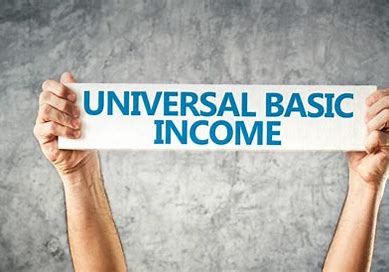The Value of Cryptocurrencies, and How a UBI Best Fits In
If you read my earlier post you’re all caught up, but for those who’re just seeing this one, here’s a really quick synopsis. I argue that the best way forward for a blockchain-based organization is by becoming a political party. In this way, the organization can achieve its fullest potential in changing the world. I argue that for all other applications, those that currently hold power will either be able to stop a blockchain/cryptocurrency or be able to adopt and corrupt it such that they retain their power.

The latter I see as more likely. I also said that a universal basic income (UBI) makes by far the most sense within a blockchain-based political party. This post is explaining why I think that’s the case.
What gives a cryptocurrency its value? There are two things:
- Our shared agreement of its value, i.e. what you can do with it.
- In the case of blockchain-based cryptocurrencies there is also value in the security of the transactions.
The security of the transactions is important and adds some value to the currency, such that any well-designed cryptocurrency will have this inherent value. Even with this inherent value though, it is still worthless without people agreeing to use it. In other words, it can be the most secure currency on the planet, but if you can’t do anything with it, it’s still worthless. For this reason, I like to focus on the shared social agreement of value when discussing any cryptocurrency.
I would argue that for new cryptocurrencies, it is important for them to start out with a real-world application. Being able to spend the currency to accomplish something in the real world approaches the very definition of value. So, why not build that into the currency to begin with.
The idea of creating a blockchain-based organization gets into this. If the blockchain used the cryptocurrency to better organize people and give them a use for the cryptocurrency within the organization, this would clearly add value to the currency. The applications of this kind of thing are obvious within the business world. This, combined with a sufficiently advanced AI could automate the management of a business. If this technology stays within the business world however, we will end up with a world where each business has its own currency. Eventually, this will give way to businesses as the new governments. That’s a future I believe only the business owners want.
A more utopian vision of the future comes when this concept is applied to a political party. Using the currency to hold a vote on an issue, or to become a candidate of the party, or other functions necessary for a political party would give the currency some inherent value. More value would be added in that the party, being blockchain-based, would be a direct democracy in which votes and elections could not be rigged. I don’t know about the rest of the world, but here in the US, that is a big deal right now. Throw in that there is no cost associated with the organization running, and you’ve got a significant advantage compared to the traditional parties, which will resist going to a blockchain-based organization simply because the people in positions of power and authority within those parties would lose that power and authority. Using that political advantage to get members elected to positions within the old-world government is the next step, but that’s getting into a whole other area of discussion. How the new system must interact with the old is something I’ve given a great deal of thought to, but it’s not the topic of this post. For now, let’s consider how a UBI would work within that organization.

A UBI within that context would equate to the ability to perform a certain number of tasks within the organization per interval of distributions. In a political party, the UBI makes sense as ideally you want everyone to be able to participate equally. You also want to make sure people are participating. A democracy cannot survive when the people do not participate in it. Thankfully, this system would make it incredibly easy and secure to participate. Because of the importance of participation, and the relative ease of it, to make the UBI have the most value, you don’t just give it away. I realize that this gets away from the tradition idea of a UBI, after all the word universal doesn’t have preconditions. However, an unconditional UBI will cause people to devalue the currency because people operate on an assumption that effort creates value. In other words, when no effort is required to attain something, it’s value is immediately decreased in the eyes of anyone who knows it was obtained without any effort. This is just a part of the human condition and cannot be changed.
For those reasons, I propose that the best way to introduce a UBI is to make it a condition of participation within the system. Within a political party, what this means is voting on things. If you voted each time you were able to vote, you would receive 100% of the UBI distribution for that period. As your participation rate goes down, so does the percentage of the distribution you would receive. It’s not a traditional UBI, which is unconditional, but it is a way to create all the right incentives within the system and ensure people participate such that the system survives. I really don’t think it’s too much to ask of people to vote, and remember calling a vote is not free within the party, so there is a mechanism of control built into the system such that you’re not having to vote on extraneous things. It is by far, in my view, the best application of this technology, and it leads to the most ideal future.
As always, I welcome your thoughts on this. Leave me a comment if you want to get into it.